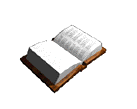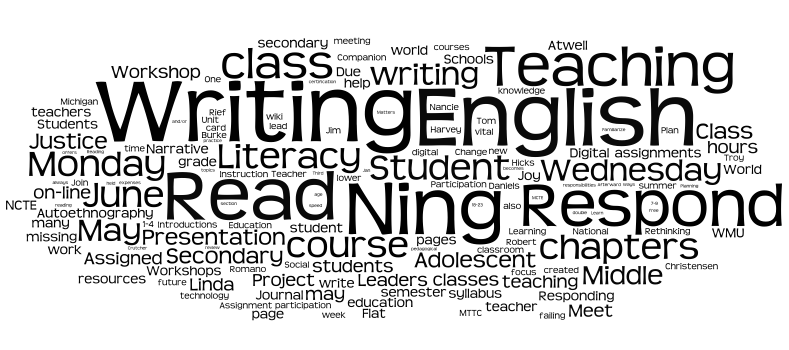Teaching Writing in Secondary Schools
Education either functions as an instrument which is used to facilitate integration of the younger generation into the logic of the present system and bring about conformity or it becomes the practice of freedom, the means by which men and women deal critically and creatively with reality and discover how to participate in the transformation of their world. Paulo Freire from Pedagogy of the Oppressed |
Learning to write can empower students to trust and value their own words and voice, to inquire more deeply into knowledge and ideas, to be creative, to better understand themselves and the world around them, and to speak out clearly and cogently on topics that matter.
Facilitating the power of writing will be the focus of this section of English 4790 Teaching Writing in the Secondary Schools. Aspiring and practicing teachers will write about and put into cultural context their own experiences learning to write, learn about fostering student individuality, independence and creativity in writing workshops, examine effective ways to improve student writing that go beyond cook-book approaches, and learn how to develop and integrate writing into socially, culturally, and politically meaningful curriculum relevant to young people and the world today. We will thoughtfully consider the new Common Core State Standards and ways to help students meet and exceed them.
Class will be held in a wireless, laptop classroom in Brown Hall specifically designed for English education courses. This room will allow us to integrate technology into language arts teaching in a "classroom of the future." Our class will be organized by our on-line syllabus that also serves as an electronic, hyperlinked, textbook. Future teachers will work extensively with multimedia digital writing platforms to prepare them to foster the online composing, collaboration, revision, and publication of their students. We will be working with teacher created, free, Internet resources, not for-profit corporate materials. (See SchoolTM) The course will clearly draw on recent research in teaching of writing.
Technological change is reshaping the world our students will be living in as this now classic video indicates:
Course discussions will be significantly extended in the class on-line discussion forum on the English Companion Ning, a remarkable resource with, at the time our course begins, 38,730 English teacher members.
As the capstone experience for English Education majors, this course entails an exciting variety of professional activities and responsibilities. You should join NCTE, MCTE, and/or MRA and read regularly the English Journal or Voices from the Middle.
I have created resources that maybe helpful to you in your journey toward certification and employment as a secondary English teacher. With former students I have created an extensive wiki about seeking a job teaching secondary English and a webpage of information for aspiring teachers. Information about the Michigan Teacher Certification test is available on the MTTC website, and on the MTTC page on the English Job wiki. You may also want to review information about intern teaching.
This highly condensed summer semester course offers 4-credit hours at double speed. We are meeting 7 hours per week in class, with substantial reading, course work, and meetings with student groups outside of class time. It will difficult to be successful in this class if you are taking other courses or working many hours.
Class participation is vital in 4790 and one class meeting of a summer course equals a full week during the regular semester. Missing 2 classes will lower the grade and missing 3 or more classes may lead to failing. See my philosophy regarding participation and attendance.
This course will follow WMU policies regarding academic honesty.
I support the Safe on Campus environment (387-2123), and I recommend gay and straight future teachers join GLSEN.
Being a college student can be stressful; WMU has many resources to foster student health and well being and there are resources on line, such as esperanza. English 4790 also offer free on-line therapy from Eliza!
My office is 723 Sprau Tower, 387-2605. Office hours are after class and by appointment. You can always reach me via email.

Atwell, Nancie. In the Middle Second Edition. (Boynton/Cook, 1998)
Beach, Richard, Amanda Thein and Allen Webb. Teaching to Exceed the English Language Arts Common Core State Standards: A Literacy Pratices Aproach for Grades 6-12. (Routledge, 2012)
Christensen, Linda. Teaching for Joy and Justice: Re-Imagining the Language Arts Classroom. (Rethinking Schools, 2009)
Major Assignments
 |
Class & Ning Participation
Literacy Practice Event Description |
20% 10% 20% 10% 20% 20% |
Introductions, Planning the course, Ning, Literacy Narrative
May 9 Thursday: Literacy Practices & Common Core Standards I
Before class:
1. Read carefully through the entire on-line syllabus, including all assignments. Bring any questions about the syllabus and assignments to class.
2. Familiarize yourself with the Literacy Narrative Assignment.
3. Read: Common Core Standards, (PDF) p. 1-5, 37-43, 47-52. [A Word version of writing standards 6-12, does not include important introduction and is from NY State; specific NY standards are highlighted. But this version is useful since you can more easily cut and paste.]
4. Read 2011 NCTE Policy Statement on Current Educational Policy (Standards and Testing).
5. Read: Teaching to Exceed, Chapter 1.
6. Examine resources on the Teaching to Exceed website.
7. Join the English Companion Ning and respond to Allen's blog on Teaching to Exceed.
In class: Read carefully the Joyce Davidson Case Study making a list of the strengths and weaknesses of Joyce's instruction.
May 14 Tuesday: Literacy Practices & Common Core II
1. Read: Teaching to Exceed, Chapters 2, 3, 4.
2. Engage in On-Line Role Play for Chapter 1 at Literary Worlds' Virtual School.
3. Critique of the Common Core Standards: Creating Idiot-Savantism; Educational reform in the era of GERM (comic).
4. Respond on Ning to reading from Teaching to Exceed.
5. Join NCTE and subscribe to the English Journal.
In class: Writing Tips: Dialogue: 8 Tips, Punctuating, Not Difficult
May 16 Thursday: Literacy Practices & Common Core III
1. Read: Teaching to Exceed, Chapters 8, 11
2. Engage in On-Line Role Play at Literary Worlds' Virtual School
3. Critique of emphasis on testing: Atlanta Cheating Scandal
4. Respond on Ning to reading from Teaching to Exceed
Meet Rick Beach:
May 21 Tuesday: Literacy Practices & Common Core IV
1. Read: Teaching to Exceed, Chapters 12 & chapter of your choice
2. Engage in On-Line Role Play at Literary Worlds' Virtual School
3. Due: Literacy Practices Event Description
4. Respond on Ning to reading from Teaching to Exceed
May 23 Thursday: Writing Workshop I
|
|
May 28 Tuesday: Writing Workshop II
1. Read: In the Middle by Nancie Atwell chapters 3-6 (to page 217)
2. Respond to Ning on "Writing Workshops"
3. Due: Literacy Narrative
May 30 Thursday: Responding to Writers
1. Read: In the Middleby Nancie Atwell chapters 7-9 (pages 217-330) plus one chapter 10-14 (assigned to groups in class)
2. Read: "Rethinking a Writing Teacher's Expertise" Maja Wilson (English Journal, Jan 2010)
3. Respond to Ning on "Writing Workshops"
4. Optional: Listen to Troy Hicks on the Digital Workshop
June 4 Tuesday: Social Justice and Writing Instruction I
1. Read: Read: Teaching for Joy and Justice, chapters 1-4 (to page 208)
3. Due: Responding to Student Writing
Meet Linda Christensen:
June 6 Thursday: Social Justice and Writing Instruction II
1. Read: Teaching for Joy and Justice, finish
3. Due: Writing for Change Proposal (1-2 pages of ideas)
June 11 Tuesday: Multi-enre Writing I
1. Read: To be determined by student leaders
2. Respond on Nicenet (key 8DH696F83)
June 13 Thursday: Multigenre Writing II, Writing and ELL Students
1. Read: To be determined by student leaders
2. Respond on Nicenet (key 8DH696F83)
June 18 Tuesday: Writing and ELL Students, Writing Centers
1. Read: To be determined by student leaders
2. Respond on Nicenet (key 8DH696F83)
June 20 Thursday: Writing Across the Curriculum; Writing in Alternative Schools
1. Read: To be determined by student leaders
2. Respond on Nicenet (key 8DH696F83)
June 25 Tuesday: Final Project and Class Evaluation
1. Due: Writing For Change Unit Plan
Examine Other On-line Secondary English Methods Courses
A few additional resources -- there are so many!:
Digital Writing, Digital Teaching, Troy Hicks
Secondary Worlds, Robert Rozema
Upcoming Events
Oct 4 MCTE Fall Conference, Lansing
Nov 21-24 NCTE National Conference, Boston


